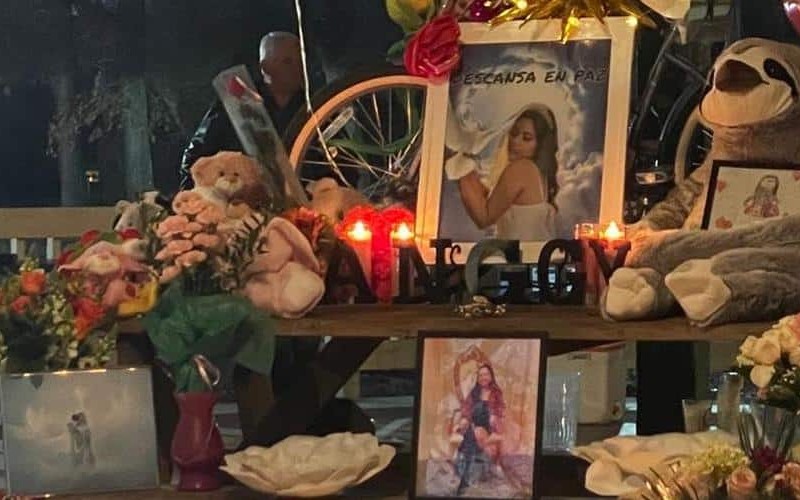Anggy Diaz’s Story Shines a Light on Immigrants Facing Domestic Abuse
Despite headlines often describing her as an “undocumented immigrant wife,” she was not nameless. Her friends and family lovingly called her “Anggy.”

With the meteoric rise in popularity of “true crime” in recent years, we often see media coverage and content creators going through every gruesome detail of the crime. While learning about the murder of Anggy Diaz of Magnolia, Texas, the media coverage that disclosed the grisly details of the crime centered mainly around the alleged murderer, Diaz’s 21-year-old husband. When it came to the victim, headlines often described Diaz as his nameless “decapitated newlywed wife.”
She was not nameless; however, her friends and family endearingly called Diaz “Anggy,” she was a loved one who had just married her boyfriend. The two had met at work; from an outsider’s perspective, they seemed to be a happy couple. Diaz, a Nicaraguan immigrant, worked at a local meat market and taquería for more than three years and had recently become a fitness coach, something she had worked hard to achieve and was incredibly proud of.
Described by those who knew her as fun, bright, optimistic, and with a big sense of humor, Diaz was the eldest of four siblings and was studying to become an accountant before deciding to leave her home country of Nicaragua so she could better support her mom back home, who was undergoing cancer treatment. She was described as a hard-working young woman with a big heart, juggling two jobs with the sole purpose of supporting her family, but only three months after her wedding, Diaz’s life was cut tragically and viciously short.
On January 11, Angela Diaz was found deceased by her in-laws inside the small home she shared with her 21-year-old husband, Jared Dicus, in Waller County, TX. Her newlywed husband, seen smiling by her side in so many photos, had allegedly stabbed, dismembered, and decapitated her the night before.
Domestic Violence Flags Ignored
According to an interview by KHOU 11, Waller County Sheriff Troy Guidry stated that police had previously been called to the residence on several occasions due to disturbances. Their small home was located in the backyard of Dicus’ parents’ residence.
It was Dicus’ parents who noticed something seemed off, confronted their son about it, found Diaz, and immediately alerted the authorities. Despite the alleged confession by Dicus, a motive for the murder is yet to be disclosed. Dicus is being held on a $500,000 bond pending court proceedings, an amount District Attorney Sean G. Whittmore has argued is not high enough, considering the heinous nature of the crime.
Hindsight is 20/20, and some of Diaz’s acquaintances are now wondering if they might have missed the signs that something was wrong in her marriage. According to various reports, her friends could tell something wasn’t right after the wedding but never imagined it would end this way. Her boss, Veronica Jimenez, told Univision 45, “She was happy, very happy with her husband. But there were days when she was different. She was tired, but I wasn’t sure if she was tired because of her job or because of her relationship.”
According to research by Esperanza United, reasons domestic abuse victims don’t report their abuse may include self-blame, shame, guilt, loyalty or fear of their partner, fear of deportation, lack of confidence in the police, and previous experience with abuse as a child. This is often closely related to their childhood and several cultural factors, such as toxic gender role expectations fueled by patriarchal social structures such as machismo and marianismo.
Based on this same research, about 1 in 3 Latinas in the U.S. (34.4 %) will experience intimate partner violence during their lifetime, and 1 in 12 Latinas (8.6%) have experienced intimate partner violence in the previous 12 months. Having an undocumented immigration status compounds the situation with fear of deportation from the United States, with many undocumented immigrants saying they are reluctant to report domestic violence or any other type of crime victimization because of this fear.
Abusers often try to use a person’s immigration status as a method to control, making them particularly vulnerable. Many immigrants with undocumented immigration status aren’t aware that the law gives them a number of protections. Victims of domestic violence and human trafficking have special safeguards in place to protect them.
A candlelight vigil was held on January 15, 2023, to remember and honor Diaz’s life. In between their grief and pain, her family expressed their gratefulness for the community’s support and outpouring of love. A GoFundMe page was set up to help raise money for her burial and other services. On January 24, Diaz’s remains were taken back to Nicaragua, where the rest of her family gave their final goodbyes, and she will be laid to rest.
Domestic violence continues to devastate lives. If you or anyone you know is a victim of intimate partner violence, there are various resources available to help.
National Domestic Violence Hotline
1-800-799-SAFE (7233)
Available 24/7 in more than 170 languages.
All calls are toll-free and confidential.
Family Time Crisis Center
281-446-2615
National Network for Immigrant and Refugee Rights
1-510-465-1984
Crisis Text Line
Text START to 88788




